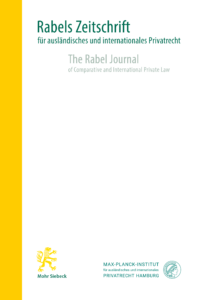Views
Amendment of Chinese Civil Procedure Law Concerning Foreign Affairs
by Du Tao*/Xie Keshi
On September 1, 2023, the fifth session of the Standing Committee of the 14th National People’s Congress deliberated and adopted the Decision of the Standing Committee of the National People’s Congress on Amending the Civil Procedure Law of the People’s Republic of China, which will come into force on January 1, 2024. This amendment to the Civil Litigation Law implements the Party Central Committee’s decision and deployment on coordinating domestic rule of law and foreign-related rule of law, strengthening foreign-related rule of law construction, and among the 26 amendments involved, the fourth part of the Special Provisions on Foreign-related civil Procedure is exclusive to 19, which is the first substantive amendment to the foreign-related civil procedure since 1991.
The Inter-American Court of Human Rights: first judgment on international child abduction
Guest post by Janaína Albuquerque, International Lawyer and Mediator
The Inter-American Court of Human Rights (IACtHR) has just published their first ever judgment on an international child abduction case in Córdoba v. Paraguay, which concerns the illicit removal of a child who was habitually resident in Argentina. The applicant and left-behind parent, Mr. Arnaldo Javier Córdoba, claimed that Paraguay violated his human rights by failing to enforce the return order and ensuring the maintenance of contact with his son. At the time of the abduction, the child was about to reach 2 years of age and the taking parent relocated, without the father’s consent, to Paraguay.
Moroccan Supreme Court on the HCCH 1996 Child Protection Convention
Among all Arab and Muslim-majority countries, Morocco stands out as the only State to have ratified seven (7) HCCH Conventions. This number of ratifications, comparable to that of other prominent countries such as United States or Japan, speaks volumes about Morocco’s commitment to being an integral part of the global network of jurisdictions benefiting from the work of the HCCH on the harmonisation of private international and fostering mutual legal cooperation. The decisions of the Moroccan Supreme Court also reflect these efforts as the Court has shown its willingness to oversight the proper application of the HCCH Conventions (on the application of the 1980 HCCH Convention, see here). The Supreme Court Ruling No. 71 of 7 February 2023 briefly commented on here is another notable example related to the application of the 1996 HCCH Child Protection Convention. The case is also particularly interesting because it concerns the establishment of a kafala under Moroccan law for the purpose of relocating the child in another Contracting State (France in casu).
News
Virtual Workshop (in English) on June 3, 2025: Michael Karayanni on “Voice and Exit in Private International Law: The Case of the Israeli Inter-religious Regime”

On Tuesday, June 3, 2025, the Hamburg Max Planck Institute will host its monthly virtual workshop Current Research in Private International Law at 11:00 a.m. – 12:30 p.m. (CEST). Professor Michael Karayanni (Hebrew University of Jerusalem) will speak, in English, about the topic
“Voice and Exit in Private International Law: The Case of the Israeli Inter-religious Regime”
Private international law can play a significant role in countries with inter-religious legal regimes by offering individuals an option to “exit” their personal religious law in favor of secular law in effect in a foreign country. My presentation will examine the development of the lex loci celebrationis choice of law rule within Israel’s inter-religious regime. Additionally, it will investigate whether this development has empowered individuals with an adequate “voice” to challenge community-based religious norms.
The presentation will be followed by open discussion. All are welcome. More information and sign-up here.
If you want to be invited to these events in the future, please write to veranstaltungen@mpipriv.de.
RabelsZ: New issue alert
 Issue 2 of RabelsZ 89 (2025) is out. All content is Open Access: CC BY 4.0 and more articles are available Online First. The full table of contents is available here.
Issue 2 of RabelsZ 89 (2025) is out. All content is Open Access: CC BY 4.0 and more articles are available Online First. The full table of contents is available here.
3rd Postgraduate Law Conference at the Centre for Private International Law and Transnational Governance
The 3rd Postgraduate Law Conference of the Centre for Private International Law is now open for registration.
The theme is “New Dimensions in Private International Law” and the conference will take place online on 6 June 2025 in the morning. Topics include commercial, family and maritime law, as well as law in the digital age and sustainability and corporate responsibility.


